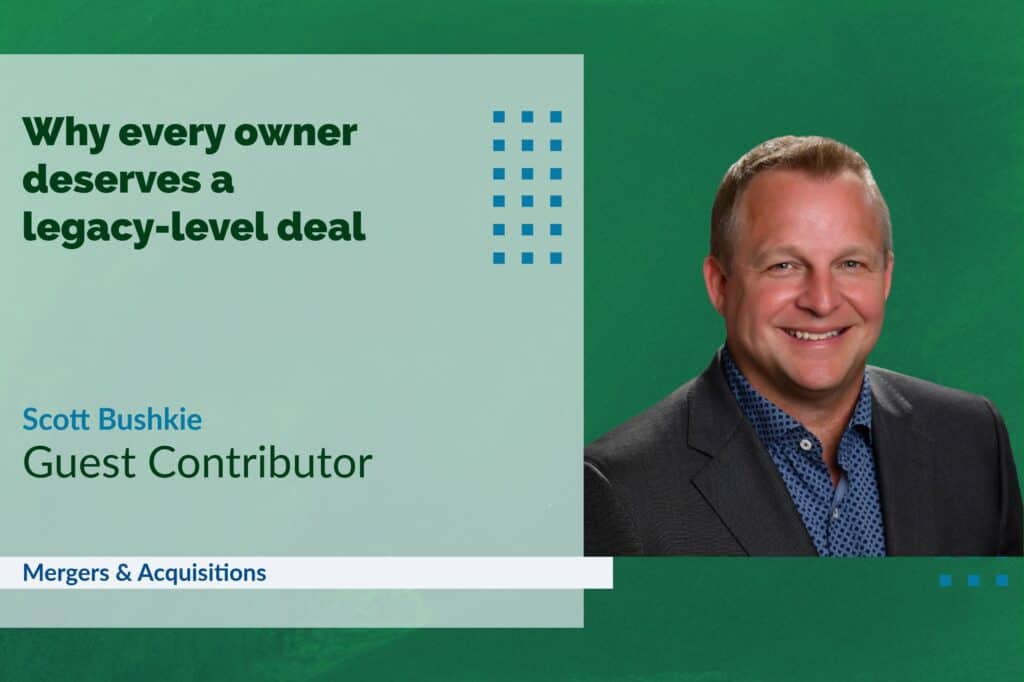
October 20, 2025
Selling a business is one of the most important decisions an owner will ever make.
It’s not just a financial exit.
It’s the moment decades of work and risk-taking turn into a new future.
And while price matters, many sellers care about more than the sale proceeds alone.
They want employees protected, customers cared for and company culture preserved.
Above all, they want their family to be secure.
They want to feel proud of who they sold to and how that decision shapes the next chapter of their life.
A legacy-level deal delivers that sense of financial security and pride.
It goes beyond the headline number to align the transaction with what matters most to the seller.
Defining a legacy-level deal
A legacy-level deal isn’t just about the highest price – it’s about matching the sale to the owner’s financial and personal priorities.
For some, that means maximizing value and minimizing taxes.
For others, it’s ensuring employees have an opportunity, the culture stays intact or customers remain in good hands.
When all those priorities are honored, an owner can walk away confident in their choice.
Why some owners miss out
Unfortunately, some owners never achieve this outcome because they accept an unsolicited offer or enter into one-on-one negotiations without giving the market a chance.
An unsolicited offer can feel flattering, even validating.
But those offers generally come from professional buyers whose whole job is to acquire companies in a way that favors their employer or investment group.
That means paying as little as possible while shifting as much risk as they can onto the seller.
Any one-on-one negotiation is bound to leave an owner guessing whether the price is fair and the terms are balanced.
With no market check, the buyer controls the process and holds nearly all the leverage.
That imbalance can lead to years of second-guessing and sleepless nights as the seller replays the deal and wonders what “could have been” if they’d explored more options.
The power of competition
The path to a legacy-level deal is a deliberate, structured sale process that attracts several qualified buyers at the same time.
Instead of relying on whoever knocks first, a structured process identifies and engages a range of strategic and financial acquirers, sets clear deadlines and collects offers within the same window.
When buyers know they are competing head-to-head, several things happen.
Values tend to rise because no one wants to lose a good opportunity.
Terms become more favorable, with more cash at close, cleaner deal structures and stronger protections for the seller.
Certainty to close improves, because there are alternatives if one buyer falters late in the process.
And, often just as important, having multiple choices allows an owner to weigh cultural fit and long-term vision alongside financial outcomes.
If an unsolicited offer lands on your desk
If an unexpected buyer shows interest, congratulations – you have an attractive business.
But beware of moving forward too quickly and locking yourself into a deal that doesn’t reflect true market value or protect your key priorities.
Pause before signing anything.
Gather your trusted advisors before you get too deep into conversations.
Don’t share confidential data or grant exclusivity without M&A advisory and legal support to protect your best interests.
Get a Real Market Analysis to understand if the offer is reasonable and what the market might actually pay.
Then, work with an M&A advisor or investment bank to run a structured sale process.
This can help ensure you’re seeing the full market and creating the conditions that drive maximum value.
Bringing in additional bidders can confirm whether the initial offer is competitive and create the leverage to negotiate stronger terms.
Without that step, it’s hard to know if a better deal – and a better future – is possible.
A legacy, not just a transaction
Selling a business isn’t just a financial event – it’s a legacy event.
Most owners get one shot at it.
Entering into one-on-one negotiations without other bidders puts your future in someone else’s hands.
But when there’s true competition, you hold the leverage to shape a deal that matches your goals, your values and the future you want.
A legacy-level deal is about finishing strong and selling with zero regrets.
It’s about turning decades of hard work into the reward you’ve earned and a future you can feel proud of.
That’s the legacy every owner deserves.
 Feeding customers in a relaxed setting for 90 years
Feeding customers in a relaxed setting for 90 years Inthewoods Sugar Bush gets ‘sappy’ with maple syrup
Inthewoods Sugar Bush gets ‘sappy’ with maple syrup







